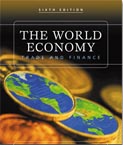Quieting the R-word: US economy proving robust
 Washington - In television lifestyle reports, predictions by respected economists and even the US presidential race, there has been no escape for months from the dreaded R-word: recession.
Washington - In television lifestyle reports, predictions by respected economists and even the US presidential race, there has been no escape for months from the dreaded R-word: recession.
It has been nearly a foregone conclusion that the world's largest economy was slipping into recession, if the wasn't already contracting. But there was an abrupt change in the drumbeat this month, with warnings of economic peril becoming suddenly fewer and less threatening.
"Recession? Not so fast," says the Wall Street Journal.
By definition, two successive quarters of economic contraction spell recession. But already in the last three months of 2007 the US locked in a slim increase of 0.6 per cent, and for the first quarter this year statisticians announced the same rate of growth, at least in early estimates.
"A couple of months ago it seemed like we were on the abyss," said Jay Bryson, global economist with Wachovia Corp. "Things have changed. ... The numbers we've seen recently haven't been as bad as we were led to believe just a few months ago."
Unemployment figures are below those of past recessions. US consumer spending, the cornerstone of the economy, beat expectations for April, except for weak car sales.
"So far, most of the economic data outside of homebuilding and house prices have not met the recession forecasters' downbeat expectations," Business Week reported.
The US stock market, which often rebounds in the months ahead of an economic upturn, has rallied from its low point in March.
Analysts attribute the possible dodging of recession to the US Federal Reserve Board's rapid loosening of monetary policy. Fed Chairman Ben Bernanke endured weeks of criticism from Wall Street coming into the new year for not doing more to steer the US clear of the impending crisis. But the Fed has dropped its prime interest rate from 5.25 per cent in September to now 2 per cent.
At the same time, the US Congress and President George W Bush agreed to an economic stimulus package including more than 100 billion dollars in personal income tax rebates.
Yet, this may not immediately brighten the confidence of US consumers.
Petrol prices keep climbing, and US citizens are spending more of their income at the supermarket as food becomes more expensive. Meanwhile, their homes continue to lose value. It is no surprise, then, that US voters consistently rank the economy as the most important issue in this year's presidential race.
Wachovia Bank rates the chance of a recession still at 45 per cent, down from 90 per cent certain in April. A Wall Street Journal survey of 55 business economists estimated the odds of recession at an average of 63 per cent.
But even avoiding a recession may not be cause for celebration.
"To be sure, even economists who are becoming more upbeat say the US may be in for a period of protracted sluggish growth," said the Wall Street Journal. (dpa)